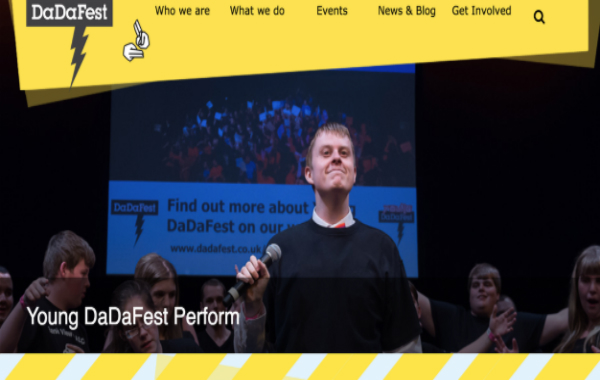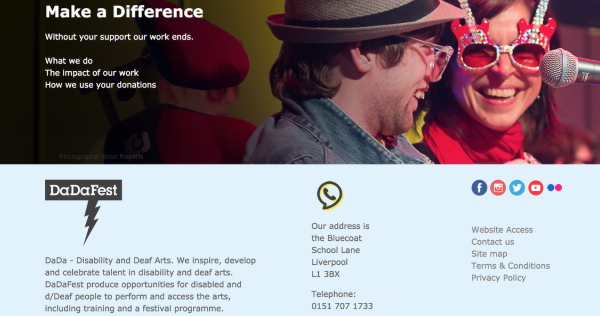
DaDaFest's new website has seen an increase in pageviews of 665% over the two month's since its launch.
When we say want to provide more access, what do we mean? Access more what?
Visits? Page views? Conversions? Well, yes.
But how about access to a more diverse user base?
I’m on the Board of DaDaFest, a disability and Deaf arts organisation based in Liverpool that was established in 1984. It has a vision; to inspire, develop and celebrate talent and excellence in disability and deaf arts. DaDaFest uses the arts to educate, challenge attitudes and remove the barriers that restrict life choices for disabled people to live independently and equally in society.
It runs events, nurtures talent amongst disabled young people and has a fantastic biennial Festival.
One of the things I was asked to look at was an overhaul of the organisation’s communications and marketing and an area which leapt out for development was the website, a cluttered, clumsy and unattractive one which hadn’t changed much for several years. Crucially, it had a difficult to use back-end which left staff at DaDaFest baffled and incurred ongoing costs to get anything done.
For any organisation, accessibility must be a paramount concern when developing a new website. For DaDaFest, it’s its lifeblood - it’s what the organisation is all about. The existing website, in placing access it its core, somehow forgot to reflect the joy, vibrancy and excitement of the organisation, presenting a rather dull experience.
Is it possible, I wondered, to create something lively and appealing to all users whilst improving upon an already high standard of accessibility?
I’ve worked successfully before with Web, a company based in Edinburgh with whom I developed websites for The Lowry, Manchester International Festival and this one, Result CIC. I approached Andy Adamson, Web's founder and Director, and asked how he felt about developing a website which placed accessible usability as the very highest priority but which didn’t compromise on the other stuff.
About a year later, mission accomplished!

The new DaDaFest website launched in May 2018. As you’d expect, its creation involved a thorough examination of how a new website could best support the organisation’s business plan. It also involved lots of research into what best practice accessibility is, and that was vitally important, but so was considering the different needs of a huge variety of users and their specific requirements.
This included people who are d/Deaf, people who have a visual impairment, people with dyslexia, learning impairments, motor issues… We wanted to go beyond the tried and tested (but still underused) likes of a signed video (got that), of classifying searchable content via the type of access it provides (got that) and so we delved deeper.
We took into account things like the use of colour to support people with dyslexia, (the site contains ‘dyslexia friendly’ pages), having access keys to assist users moving around the website, building a frame work conforming to the ‘AAA’ standard of Web Content Accessibility Guidelines (WCAG) 2.0. For screen reader software, we’ve avoided generic links such as ‘click here’ or ‘more’. Instead, the text of the link describes the destination. We avoid using language which is complex for some users, the text is large, contrasts with the background, and the interface is easy to use. The list goes on.
But here’s the thing. If you don’t have specific access requirements when using the site, do you notice all of that or do you just see an exciting and easy to use website? We hope it's the latter because, as well as taking all of the accessibility requirements into account, we never forgot to include the enthusiastic feedback from the team at DaDaFest and the wonderful Young Leaders there who wanted something which reflected the diversity, quality, originality and excitement of what DaDaFest is and does.
It may only be 2 months old at the time of writing, and there are lots of reasons why a website’s stats change (not least of which is the ability of staff to actually use a CMS with ease), but the fact is that page views of www.dadafest.co.uk have increased for that 2 month period year on year by 665%.
No, that’s not a typo. 665%.
Some of those visitors to the site show a marked increase in the national and international reach of the site too, supporting a key element of the business plan’s objectives.
It’s not a finished thing. The site has the scope, flexibility and ambition to continue developing.
Why?
To access more.
Because it seems that when you place genuine access at the heart of what you do, things improve for everyone.
If you’re interested in working with Web to improve your levels of accessibility online, contact them here.
Robert Martin is a freelance marketing consultant mainly working in the arts and culture. Find out more on his website.